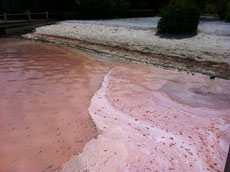A resolution has been submitted to the Gaumee Majlis (National Council) of the Maldivian Democratic Party, demanding confidence votes in the party’s leadership.
The apparent factionalisation follows an attempt by Party President and former Fisheries Minister Dr Ibrahim Didi to introduce a shadow cabinet to the party.
The resolution called for a “confidence assessment” of all the members in the senior leadership of the party, and was forwarded by the party’s Chair of Elections Committee and former head of National Social Protection Agency (NSPA), Ibrahim Waheed.
The resolution submitted proposes that the national council take a confidence vote in the leadership of the party President Dr Ibrahim Didi, Vice President MP Alhan Fahmy, Interim Chairperson MP Moosa Manik and Deputy Chairperson (Finance) Ahmed Mausoom.
In a separate resolution, a motion of no confidence was forwarded against the party’s Secretary General Hassan Shah.
MP Alhan Fahmy has described the resolution as a “coup attempt” to depose him from his position as the party’s vice president following his reform attempts, he told local newspaper Haveeru.
Fahmy stated that the resolution had been forwarded contrary to the MDP’s constitution.
He also said that he had been elected to the position with a higher number votes than the number of votes that the Party President, Dr Didi, and said he did not believe that such a motion could be forwarded to the national council.
According to article 30, clause (f) of the MDP’s constitution available on its website, the chapter describing the powers of the national council states it is able “to debate and assess the confidence of the President of the Party or the Vice President of the Party or the Chairperson or a Deputy Chairperson, if the members of the party submits a complaint in disapproving their actions.”
Fahmy was not responding to calls at time of press. However the sponsor of the resolution, Mohamed Waheed, said that he had submitted the resolution under the right given from the MDP Constitution.
“I submitted the resolution in accordance with the MDP Constitution. The reason for the submission was that some of the party’s leaders have been issuing statements and interviews against the MDP’s Constitution, after the coup on February 7,” he said.
Responding to MP Fahmy’s claims, Waheed said that Fahmy “should read the MDP constitution thoroughly. The party constitution gives me the right under the article 30. Reforms should be brought in accordance with the party constitution,” he said.
Party constitution manipulated?
Waheed alleged that some officials of the party leadership had manipulated the party’s constitution after it was passed at the party’s congress on October 2010.
“There was a committee selected to draft the party constitution. I was the chair of the committee. The other members were MP Mohamed Aslam, MP Mohamed Rasheed and former state minister of Youth Ministry Mohamed Hussain Rasheed ‘Bigey’,” Waheed said.
Waheed alleged that the version of the party’s constitution on in the party’s website was a ‘manipulated’ version.
“The current version [of the party constitution] that is available on website is not the original version that was passed in the congress.”
“I remember very clearly that the version that was originally passed in the congress did not include a party cabinet, and did not include the phrase that the party president was the highest authority when the party is in opposition,” he continued.
“During the congress the powers of the Party President and Vice President were delegated to the Chairperson and the Parliamentary Group leader. But the amendment to remove the post of party president and vice president did not pass, therefore the two positions remained as ceremonial positions since their powers had been delegated.
“But, the party constitution has now been manipulated and now includes stipulations that were not originally included in the party constitution. For instance, see the powers that are included for the party president in the version available on the party website. It contradictswith the powers of the chairperson,” Waheed added.
MDP President Dr Didi was not responding at time of press.
The MDP National Council is held a meeting at 5:00pm on Tuesday, however Minivan News understands that Waheed’s resolution was not on the agenda.
Former President Mohamed Nasheed is currently in the United States to promote the Island President, and meet with State Department officials. Other senior party figures such as Ibrahim ‘Ibra’ Ismail are in India meeting authorities to clarify the events of February 7 and seek support.
